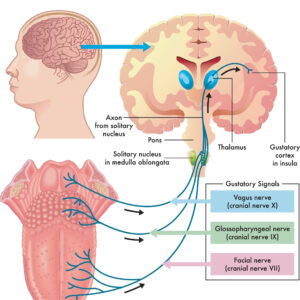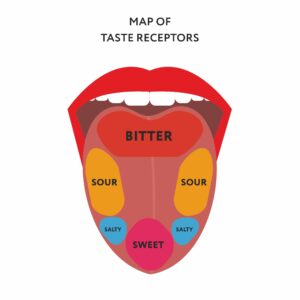Treatments for lymphoma can change the way things taste. You may get a metallic or bad taste in your mouth, or find that all food tastes the same. These changes can be caused by the medicine you are taking, or the damage to the cells in your mouth (mucositis) as a result of these treatments.
This page will provide some practical tips on how to lessen the impact taste changes have on your diet. For more information on mucositis please click the link below.

Why do taste changes happen?
We have several senses that are triggered when we eat or drink. These include taste, smell and touch (the texture or how food feels in our mouth). Our senses are triggered by receptors in our mouth and nose that then send signals through different nerves from our nose or mouth to our brain. Our brain then registers the taste.
Because the cells in our mouth and nose are fast-growing cells that live for only a short time before being replace by new cells; they are often damaged by lymphoma treatments that target fast-growing cells. This can affect the signals they send to your brain.
Salivary glands
Saliva is needed to help send signals to recognise taste. Surgery, chemotherapy, and radiotherapy can all interfere with normal saliva flow affecting your sense of taste. Also, having a dry mouth over a long period of time, can lead to mouth infections or tooth decay. These can both cause more problems with taste, smell or feeling.
How serious are taste changes?
As well as affecting your ability to enjoy food, taste changes can cause problems such as malnutrition and dehydration. The taste changes itself does not cause this, but when everything begins to taste the same, or taste unpleasant, you may find you eat and drink less than you normally would.
Malnutrition and dehydration
Malnutrition and dehydration can affect your body’s ability to heal and recover from your treatments, and fight the lymphoma. It can also lead to problems with your blood pressure, headaches, dizziness, kidney problems and more. So taste changes can be serious if it affects your diet and fluid intake.
Mucositis
We have a separate page on mucositis. However, it is worthwhile mentioning here that taste changes due to mucositis can be serious. Mucositis can increase your risk of bleeding and infection so needs to addressed quickly. See the link above for more information on managing mucositis.
Hot and cold sensations
The changes to the receptors in your mouth can also make it harder for you to feel hot and cold. You need to think about this when you eat or drink anything boiled, from the fridge/freezer, or after being cooked to avoid burning or injuring yourself while eating.
How long do taste changes last?
Taste changes related to chemotherapy usually begin to improve within weeks to months after finishing your treatment.
For other treatments, such as surgery or radiation to areas of your head and neck, some changes may be longer lasting or permanent if there has been nerve damage or permanent scarring.
Ask your doctor what to expect with taste and when you may be able to taste food normally again.
How to manage taste changes
The main things when it comes to taste changes are to make sure you still get the right nutrition, and avoid infection and bleeding.
Food for healing
You may need to train yourself to think about eating and drinking differently. Often, eating and drinking are an important part of social events, part of a celebration or simply for comfort. Some foods, tastes and smells bring enjoyment or pleasure. They may even be connected to happy memories.
Simply put, we often have an emotional connection to food.

During treatment for lymphoma, try to take the emotion out of food, and think about food and water as the fuel that helps your body heal and get better. This may need practice because we have a lifetime of learned reactions to food.
Eating and drinking well is an active thing you can do, at a time you may feel you have little control over what is happening to your body. You can choose nutritious foods and fluids that help your body cope with the treatments, recover from the damage done by the lymphoma and treatments, and stop further complications.
With each mouthful of food, try to visualise (see in your mind) new healthy blood cells being made, or lymphoma cells being destroyed. Let your emotions around food move from comfort and enjoyment to strength and control.
 Save your favourite foods
Save your favourite foods
If you have particular foods that you enjoy, save these to have as a treat when you finish treatment and your taste returns. This way you will avoid disappointment and prevent creating unpleasant memories to these foods.
Eat healthy foods you wouldn’t normally enjoy
Use the taste changes to your advantage. If you’re not going to enjoy the taste of food anyway, this is a great time to start eating all those healthy foods you have avoided because you didn’t like the taste or texture in the past.
This way your body gets the benefit of the added nutrients without the specific unpleasant taste/texture of the foods you normally avoid.
 Other tips to manage taste changes
Other tips to manage taste changes
- Maintain good mouth hygiene and clean your tongue – see tips on mouthcare here. When your tongue is coated, or you have other problems with your mouth, foods can taste worse. Rinse your mouth and brush your tongue with a soft toothbrush before and after eating.
- Try foods with different tastes – sweet, sour, salty, and bitter. You may find you can taste one or two types of flavour better than others. However, avoid salty or spicy foods if you have sores in your mouth.
- Flavour your water with lemon, lime orange juice or cordial.
- Suck on flavoured ice-blocks.
- Add fresh herbs to your food such as basil, parsley, thyme, oregano or rosemary.
- Eat regular times, and only snack when hungry. Try smaller frequent meals rather than larger meals.
- Try eating mints, sucking on hard lollies or chew gum to mask the metallic taste.
- Use bamboo, other wooden, or plastic forks and spoons rather than metal ones.
- If you can, avoid areas where food is being prepared if the smells are unpleasant to you. If you can’t avoid, use an exhaust fan and open windows when food is being prepared.
- Experiment with food, try foods that are usually bland, or add or remove flavours such as honey, ginger, salt and spices.
- Smoking can make taste changes worse. If you would like help giving up, speak to your doctor about what support is available to help you.
- Use a saliva substitute if your mouth is dry and not producing saliva. Dry mouth can make taste changes worse.
- Drink 2-3 litres of water every day. If water on it’s own does not taste good to you, try to flavour with juice or cordial. Or try jelly instead. Avoid alcohol and caffeine as these can cause dehydration and make taste changes worse.
See a dietician
Seeing a dietician can help your understand what your new nutritional needs are while having treatment for lymphoma. They can also help you create a plan within your budget, and to your liking to make sure you get the most out of food and fluids. Your GP or haematologist can refer you to a dietician.
You are eligible to get a chronic disease management plan done by your GP because you have lymphoma. These can include seeing a dietician with no out-of-pocket expense to you (if you have a Medicare card).
Watch - Diet, nutrition and lymphoma
Summary
- Changes to taste are common with lymphoma treatments.
- They may be caused by the medicine, mucositis, nerve damage or scarring.
- Practice good mouth hygiene and keep your mouth and tongue clean.
- Most taste changes improve weeks to months after finishing treatment, some can be longer term.
- Nutrition is very important when fighting lymphoma and recovering from procedures and side-effects of treatments.
- Food as a source of energy you can control, to fight lymphoma and heal your body.
- Ask for a referral to a dietician if you have problems eating and drinking water while you are having treatment.
- Your GP can make chronic disease management plan for your so you can see a dietician without charge.

